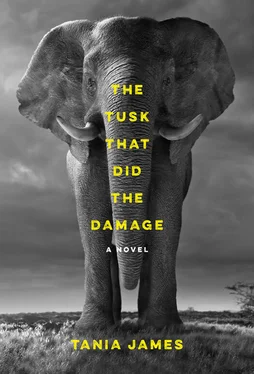On Tuesday, the day before we embarked on our hunt for the Gravedigger, an elephant was found dying on Old Raman’s farm. It had likely stumbled out of the forest and folded at the edge of the field, felled by its numerous wounds. The shooter had shown little mercy or skill, for the beast died slow, bombarded to the end by so many squinting human eyes.
The greenbacks would suspect Old Raman as accessory in the elephant’s death, lumping him with those farmers who had baited bothersome elephants in the past. One had even lodged a firecracker in a jackfruit, thus making a crater of his enemy’s mouth. But Raman was cut of a softer cloth. He brought water in a plastic bucket, and when the elephant was too weak to lift its trunk, he crept forward and every so often scooped water over the foamy slab of its tongue.
When first I heard of the dying beast, I hoped it was the Gravedigger. Jayan wanted the opposite; the hunt was all he ever thought about, even when he took me out with his friends. He spent the evening sitting over his glass with shoulders rounded, nostrils aflare, eyes so dark and intent I could see him rehearsing the kill in his head.
Yet his friends made up for his sullenness. We drank and smoked, and they dubbed me Wee Shivaram after I choked on a peg of fuel-flavored booze. I decided to accept the name even if it was lightly demeaning. To be demeaned by those fellows was to be taken under wing, and the more I laughed along, the more it seemed these boys could in time be my boys, Jayan among them. On the way home I fell, twisting my ankle, and had to limp against my brother. We flung our way forward while Jayan howled rubbish at the dark: Here he comes — the Undertaker, we’ll make of him a vulture’s dinner!
But the vultures were already dining by morning. The greenbacks burned sandalwood and ramacham to cover the dead elephant’s rot; still it stewed and spread in the heat.
Leela went on foot to see the elephant. She had not spoken one word to us since dawn, when we returned with liquor on our breath and guilt in our faces. My brother went to work in the fields, and I would have liked to do the same, but my ankle was paining me, so I was forced to stay home and suffer the lively abuses of my mother, all lazy this and rascal that.
By afternoon, I found Leela rinsing her feet at the pump. She drank a palmful and wiped the glisten from her chin. Her gaze came to rest on the laundry line where the wind was billowing into Jayan’s blue mundu, the one she had been holding as he was carried off by the Karnataka police. I waited for her to speak of what she had seen, but she was preoccupied with the mundu, staring so hard her gaze could have burned a hole through it.
Then she sighed, as if giving up. “Manu, help me with that thing.”
I limped to the laundry line and took up one edge of the mundu while she stepped back, holding the other. The fabric was damp and pliant, not yet stiffened by sun.
We tugged opposite corners as she had taught me years ago when I was her household deputy. “There were three men,” she said finally. “Drunks. Dancing on the body.”
“Of the Gravedigger?”
“As if you don’t know. Right corner.”
I nearly dropped my end. “You think we—” She thinned her lips. “But we weren’t in the forest last night, not anywhere near it! Ask anyone, Sabu, Shaji …”
“A clever couple. You could’ve been tumbling in the belly of a whale for all they’d remember.”
“Believe me—”
She tugged so hard, the fabric jerked from my grip. “Just give it here.” She took up the mundu and brushed off the small stones, then folded it by half and half again. “What kind of place is this, where men dance on the back of a god?”
I withheld the answer, knowing she was in no mood to hear it.
A place where the gods dance on ours.
Later that day, Leela told my mother she was going to church, an alibi my mother accepted with sympathy due to her own history as a young and unhappy wife.
Leela took her time pinning the pleats of her polycotton sari just so. Usually she kept her plastic mirror canted at the ceiling, reluctant to be reminded of her sun-speckled face. Dabbing kajal under her eyes, she felt something shift in her belly. She had felt no such motions since the Gravedigger’s attack. Now her hand went to her middle, searching and hoping until a belch escaped her — gas and nothing more.
She had not expected to get pregnant so quickly. During her years as Podimattom Leela, she had done abortion three times, and that was after a slew of home remedies — long peppers, papayas, mutton-marrow soup, running her belly into the back of a chair. No woman’s womb could survive such abuses unharmed, which was what she told Jayan after he proposed marriage. He laughed and said his soldiers could survive any terrain.
Back then, she was what they called “a family girl”; she only made hotel visits as arranged through her agent, an aunt in Kottayam. Jayan was the first she had brought to her home, the first to compliment the cushion covers she had sewn, the first to meet her gaze when she spoke. How strange to think she had yielded her heart simply because he had looked her in the eye, yet this smallest of gestures made her feel important and even a bit powerful. Where was that power now? She was shackled between land and sky, always looking down at the soil or up for rain.
And then she saw the dying elephant, which was not the Gravedigger, which was smaller than the tusker she had faced. Touched its grainy skin and inhaled the rot. Stood mere feet from the flaccid trunk, the enormous arm of a god outstretched. Not her god but a god all the same.
Fifty-six gods. As far as they knew.
Leela told herself she had made the appointment with Madame in order to seek out a job for Jayan — that was all. In her mind she dressed him in the greens of the greenbacks, pictured him proudly patrolling the forests and taking people on tours, the sort of job where cameras were the only things capable of shooting.
Leela stood face-to-face with an old fossil of a greenback. He looked up from his desk and fixed her with one wide hawkish eye, the other a milky slit.
She drew an important breath. “I have an appointment.”
The fossil showed her to Madame’s doorway and retreated to his post. Madame had a phone clamped against one ear; in the other she was digging a bobby pin, routing out the wax with a militant look. Noting Leela, she tossed the bobby pin aside and gestured to the seat opposite.
Maps of the region sprawled across the wall behind Madame, bristling with red and yellow and green pushpins. Leela twisted the corner of her handkerchief around her finger till the tip went cold.
“Hah, sir, thank you, sir.” Tired, impatient, Madame dropped the phone into its cradle. “An elephant was slaughtered in Sitamala. I’m sure you smelled the carcass before I did. Shot in the chest, shoulder, leg, they made a bloody sieve of that creature — eh eh! Hallo?”
Leela had closed her eyes through a sticky wave of nausea. She nodded as Madame hollered for water and tea.
“Isn’t this your second trimester? The nausea should have passed by now.”
“It comes and goes,” Leela managed. Secretly she was glad for the sickness. It served as reminder that the baby was alive.
The fossil provided them with two paper cups of hot water, a tea bag in each like a dead fish, bleeding brown. Madame took up the tea bag and dipped it thrice. “So. Your husband.”
Her husband, her husband, that ever-present subject. Couldn’t they start with any other topic — childhood, children, her nausea even? Leela had spent so many days alone with her worries, praying that her baby would survive untouched, dreaming of giving birth to a stone. Some chitchat would have offered fleeting relief.
Читать дальше












